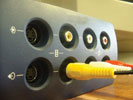

With IT infrastructure gaining continual importance and being readily available in most buildings today, there is a strong push for the extra low voltage (ELV) systems to leverage on this infrastructure. A push for these systems to go ‘network’ so to speak, thus giving rise to the development of network PA systems of some of the top PA manufacturers.
Similar to conventional public address systems, a network PA system provides facilities for announcement paging, background music broadcast as well as evacuation procedures. However, a network public address provides high flexibility in reconfiguration, system expansion and requires much simplified cabling structure. These translate to significant cost saving in the installation cost of both labour and material; as it requires less cabling, reduced cable size, conduit size and trunking size.
Network PA is very similar to computer networks, where packets of data are transmitted through the local area network (LAN) from one node to another based on the addresses assigned to them. In terms of a network PA system, a node would basically consist of a network paging console for making announcements, music servers for background music streaming and network audio amplifiers for amplifying the audio signals and powering the loudspeakers.
Another resounding feature of a network PA is it can also be integrated with other building services that are TCP/IP compliant such as the fire alarm system, CCTV system, intrusion system and building management system to provide instantaneous voice assisted response to the feedback from each of these systems. All these are accomplished within a single LAN network system.
Why TCP/IP-based system?
TCP/IP is the standard protocol used by the Internet as well local area networks to transmit files and data across a large client and server systems. There are currently network PA systems which are popular in the market but they are unable to be fully routed through the Internet, due to the proprietary protocols used by the system. This disadvantage has hindered the network PA system from being remotely monitored and managed via the Internet for cost effectiveness. A network PA using TCP/IP protocol overcomes this severe shortcoming.
A network PA system running on TCP/IP has numerous advantages over a proprietary protocol-based system. As the TCP/IP protocol is absolutely standardised on the LAN, it ensures seamless integration of TCP/IP compliant systems within a LAN. This is crucial as we progress towards interoperability of multisystems found in intelligent buildings. It is inevitable that all these systems are able to communicate on a same protocol. Also, with all these systems converging towards the IT sector, TCP/IP compliant systems will be able to co-exist on the same network cabling-infrastructure without the need of a protocol interpreter.
Where proprietary protocols do not allow routing through the Internet, TCP/IP allows the network PA system to be monitored and configured via the Internet. This enables vital system status of remotely located projects to be managed cost effectively.
Another distinguishing characteristic between a TCP/IP protocol-based system and one that is based on a proprietary protocol is the fail-safe feature of the system architecture. Proprietary protocol systems are dependent on a crucial network controller to synchronise and provide the heartbeat to the entire system. Failure of the network controller will bring the entire system to a halt. A TCP/IP-based system on the other hand is not dependent on any single equipment to ensure the operation of the entire system. Failure of any of the nodes will only affect that particular function of the node. As a summary, a TCP/IP solution is proven to be the best choice for a flexible and future-proof public address system.
Until recently, designing and building audio distribution systems with a good degree of flexibility and intelligence have been a difficult task. It is also an expensive undertaking, requiring large expenditures on wiring, conduit, switching equipment and installation labour. Conventional public address systems using traditional analog technology are often difficult and prohibitively expensive to reconfigure once installed. One such TCP/IP network solution picking up pace in the market is the VECTUS system developed by AEX System. With the VECTUS system, any audio input can be dynamically re-routed under software control to any audio output on the network in any combination; providing routing flexibility all over standard LAN. It allows full remote control over the network with re-routing of audio signals via software instead of expensive re-cabling or use of dedicated analog switching. VECTUS network PA technology allows for the co-existence of audio and data traffic over existing standard LAN infrastructure, resulting in substantial savings in cabling infrastructure.
For more information contact Lisa Karam, Out The Square, +27 (0)11 886 9931, [email protected]
© Technews Publishing (Pty) Ltd. | All Rights Reserved.